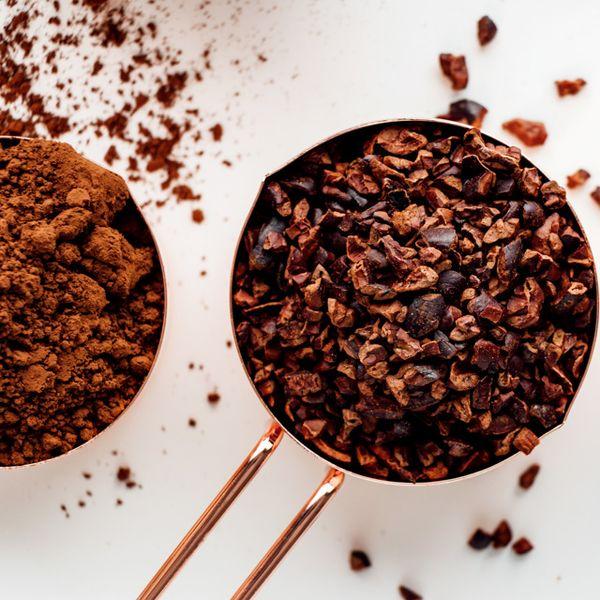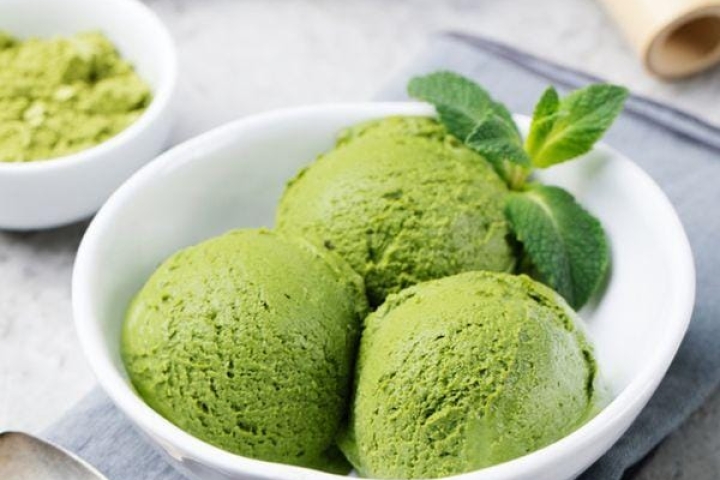Surprising Benefits of Chocolate Your Delicious Health & Wellness Ally
Who doesn't love chocolate? It's smooth, creamy, and undeniably one of life’s simple pleasures.
For some, however, chocolate is more than just a tasty treat—it's a health and wellness aid offering surprising benefits, including those for your hair, skin, and beyond.
Chocolate also provides several other perks, such as supporting healthy cholesterol levels within the normal range, enhancing cognitive function, and delivering a substantial antioxidant infusion.
Sound too good to be true? Grab a bag of chocolate cacao nibs and get ready to explore the fantastic health and wellness benefits of chocolate.
Chocolate is a Source of Certain Nutrients
Before delving into the specific health benefits of chocolate, let’s briefly review some common nutrients found in both milk and dark chocolate. Both types provide protein, potassium, calcium, and much more.
Milk Chocolate Per 25g
- 1.91 g protein
- 14.85 g carbohydrates
- .59 mg iron
- 52 mg phosphorus
- 93 mg potassium
- 47 mg calcium
Milk chocolate also contains 134 calories and 7.42 grams of fat per serving.
Dark Chocolate (70-85% cacao solids) per 25g
- 1.95 g protein
- 11.47 g carbohydrates
- 2.98 mg iron
- 57 mg magnesium
- 77 mg phosphorus
- 179 mg potassium
- 18 mg calcium
Dark chocolate with 70-85% cacao solids also contains 150 calories and 10.66 grams of fat.
Delivers Free Radical-Neutralizing Antioxidants
Every time you take a bite of chocolate, you’re providing your body with essential antioxidants. According to one study, chocolate contains more antioxidant flavonoids and polyphenols than fruit juice.1 Polyphenols are particularly effective at neutralizing free radicals in the body, which can cause damage like oxidation and potentially lead to health concerns if unchecked.
Supports Heart Health
Go ahead, sip on an occasional cup of hot cocoa or break off a corner of that chocolate bar because it might just benefit your heart. Indeed, studies have shown that the antioxidants in chocolate may help protect arteries from free radical damage and oxidation.2
Further studies have explored the role of antioxidant flavonoids in chocolate in supporting healthy levels of lipoprotein (LDL) oxidation.3
Boosts Brain Function
If your brain needs a boost, chocolate can help. Numerous studies have investigated the effects of chocolate on the mind, yielding positive results. For instance, one study found that individuals given high-flavonol cocoa for five days showed increased blood flow to the brain.4
Additional research on the impact of chocolate on the brain has demonstrated cognitive-boosting benefits for elderly chocolate consumers. One study, in particular, found that chocolate consumption improved cognitive function in adults aged 70-74.5
Moreover, chocolate contains energy-enhancing stimulants such as caffeine and theobromine, which contribute to improved brain function in the short term and support a healthy mood.6
Promotes Healthy Blood Pressure Already Within the Normal Range
Chocolate has been the subject of a wide array of scientific studies for its potential to support healthy blood pressure levels already within the normal range. These studies include those on white chocolate, polyphenol-rich dark chocolate, and milk chocolate, leading to some very intriguing conclusions.
An 8-week study reported that individuals consuming high polyphenol dark chocolate showed significant support for healthy blood pressure levels compared to those consuming the same 25g dose of white chocolate.7
Another study closely examined the polyphenol activity in chocolate and found that it has been shown to inhibit specific enzymes, which can support healthy blood pressure.8
A third study suggested that the flavonoid content may support cellular function within the arteries, contributing to healthy blood pressure within the normal range.9
Promotes Healthy Cholesterol Levels Already Within the Normal Range
There’s good cholesterol, known as high-density lipoprotein (HDL), and bad cholesterol, which is low-density lipoprotein (LDL). Although LDL comprises a large portion of the body's cholesterol, high levels of it can be concerning. HDL, on the other hand, is crucial for supporting lower cholesterol levels.
By incorporating chocolate into their routine, researchers believe that individuals may help promote healthy cholesterol levels within the normal range. Some studies have indicated that the plant sterols and cocoa flavonoids in dark chocolate were effective in supporting healthy levels of LDL cholesterol.10
Beauty-Boosting Benefits of Chocolate
Since health and beauty often go hand-in-hand, it’s no surprise that a health booster like chocolate may also enhance your appearance. Here are four ways in which chocolate can elevate your beauty game.
Offers Antioxidant Protection
The same antioxidant flavanols in chocolate that contribute to the health benefits mentioned above may also support healthy skin. Antioxidants help protect against oxidative damage caused by harmful free radicals and environmental factors while helping combat signs of skin aging.11
Supports Skin Hydration
Chocolate is a source of vitamins and minerals that impart skin-boosting benefits and may also help support skin hydration. More research is needed, but there is some evidence suggesting that chocolate supplementation could potentially enhance collagen health as well as skin elasticity and hydration.12, 13
Offers Stress Relief
The effects of daily stress can impact both your appearance and your overall health. Whether it’s puffy skin under your eyes, poor digestion, or the many other ways stress can affect how you look and feel, chocolate may help fight stress. It can aid in reducing stress levels by supporting the inhibition of stress hormones.14 Additionally, the magnesium content in chocolate is beneficial, as magnesium is a well-known mood booster with stress-fighting properties.15 Read Magnesium for Mood, Anxiousness and Stress to learn more.
Promotes Healthy Hair & Scalp
Did you know dark chocolate also supports hair health, making it look shiny and voluminous? This delicious treat can help your hair look its best. Minerals in chocolate are excellent for nourishing hair health, each in their unique way.
For instance, iron is vital for promoting oxygen transport to your cells. Some studies have linked iron deficiency to hair loss.16 Zinc, meanwhile, is essential for tissue growth and repair. Proper zinc intake, according to studies, may boost hair growth and overall health.17
Discover first-hand the health-boosting power of chocolate with chocolate cacao nibs. Make sure to sign up for BubbForest Health Emails to get expert advice and our best promotions delivered straight to your inbox.
About Lindsey Toth, MS, RD
Registered Dietitian, BubbForest Health Products
Lindsey is a nationally recognized registered dietitian and nutritionist with a soft spot for pie. She empowers people to take charge of their health by finding the balance between the pleasure and nourishment in food.
Her philosophy is that you should take care of your body because it’s the only permanent home you have. It’s what inspired her to pursue a career in nutrition and, ultimately, led her to BubbForest Health.
Sources
1 BioMed Central. 10 February 2011. https://www.sciencedaily.com/releases/2011/02/110207073748.htm
2 Vlachopoulos, et al. Curr Hypertens Rep. 2006 Jun; 8(3):205-11. US National Library of Medicine National Institutes of Health. https://www.ncbi.nlm.nih.gov/pubmed/17147918
3 Kwok CS, Boekholdt SM, Lentjes MAH, et al Heart 2015;101:1279-1287. https://heart.bmj.com/content/101/16/1279
4 Francis, et al. J Cardiovasc Pharmacol. 2006; 47 Suppl 2:S215-20. US National Library of Medicine National Institutes of Health. https://www.ncbi.nlm.nih.gov/pubmed/16794461
5 Eha, et al. The Journal of Nutrition, Volume 139, Issue 1, January 2009, Pages 120–127. https://academic.oup.com/jn/article/139/1/120/4750870
6 Smit, et al. Psychopharmacology (Berl). 2004 Nov; 176(3-4):412-9. Epub 2004 May 5. US National Library of Medicine National Institutes of Health. https://www.ncbi.nlm.nih.gov/pubmed/15549276
7 Rostami, et al. ARYA Atheroscler. 2015 Jan; 11(1):21-9.Polyphenol-Rich. US National Library of Medicine National Institutes of Health. https://www.ncbi.nlm.nih.gov/pubmed/26089927
8 Murillo, et al. Curr Pharm Des. 2017;23(17):2444-2452. doi: 10.2174/1381612823666170329144307. US National Library of Medicine National Institutes of Health. https://www.ncbi.nlm.nih.gov/pubmed/28356040
9 d'El-Rei, et al. Int J Hypertens. 2013;2013:985087. doi: 10.1155/2013/985087. Epub 2013 Mar 5. US National Library of Medicine National Institutes of Health. https://www.ncbi.nlm.nih.gov/pubmed/23533716
10 Allen, et al. J Nutr. 2008 Apr; 138(4):725-31. US National Library of Medicine National Institutes of Health. https://www.ncbi.nlm.nih.gov/pubmed/18356327
11 Fernández-García, et al. 2014 Sep; 5(9):1994-2003. doi: 10.1039/c4fo00280f. US National Library of Medicine National Institutes of Health. https://www.ncbi.nlm.nih.gov/pubmed/24964816
12 Scapagnini, et al. Nutrients > v.6(8); 2014 Aug > PMC4145303. US National Library of Medicine National Institutes of Health. https://www.ncbi.nlm.nih.gov/pmc/articles/PMC4145303/
13 Mogollon, et al. Nutr J > v.13; 2014 > PMC4082621. US National Library of Medicine National Institutes of Health. https://www.ncbi.nlm.nih.gov/pmc/articles/PMC4082621/
14 Sunni, et al. Int J Health Sci (Qassim) > v.8(4); 2014 Oct > PMC4350893. US National Library of Medicine National Institutes of Health. https://www.ncbi.nlm.nih.gov/pmc/articles/PMC4350893/
15 10 Evidence-Based Health Benefits of Magnesium. https://www.healthline.com/nutrition/10-proven-magnesium-benefits#section3
16 Shrivastava, SB. Indian J Dermatol Venereol Leprol. 2009 Jan-Feb; 75(1):20-7; quiz 27-8. US National Library of Medicine National Institutes of Health. https://www.ncbi.nlm.nih.gov/pubmed/19172026
17 Yanagisawa, Zasshi. 2008 Mar; 128(3):333-9. US National Library of Medicine National Institutes of Health. https://www.ncbi.nlm.nih.gov/pubmed/18311051





Leave a comment